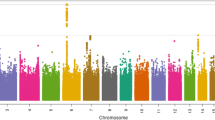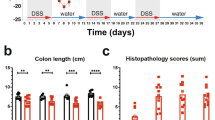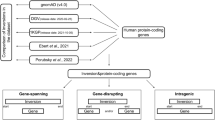Abstract
The SLC22A4 and SLC22A5 genes within the IBD5 risk locus encode the organic cation transporters OCTN1 and OCTN2. Two variants, 1672C>T in SLC22A4 and −207G>C in SLC22A5, were shown to alter these genes' functions and were identified as genetic susceptibility factors for Crohn's disease (CD). We pursued to check both putative etiologic variants in an independent population through a case–control study with 309 Spanish CD patients and 408 ethnically matched healthy subjects. Both polymorphisms were found in partial linkage disequilibrium (D′=0.86). The separate analysis of each OCTN variant evidenced no association. However, when the simultaneous presence of mutant variants in both genes was analyzed, an effect on CD susceptibility was observed (P=0.026, odds ratio (OR) (95% confidence interval (CI))=1.59 (1.03–2.45)). The previously described predisposition conferred by the 5q31-risk haplotype increased in the absence of the etiologic 1672T and −207C alleles (P=0.0006, OR (95% CI)=10.14 (1.97–98.04)). Moreover, the risk contributed by these polymorphisms was higher in the IBD5 wild-type population (P=0.003, OR (95% CI)=2.65 (1.32–5.35)), arguing against the exclusive etiological role of the OCTN variants. The haplotype pattern inferred led to the consideration of these variants as susceptibility markers only in a defined genetic context. Our data support the interpretation of the 1672C>T SLC22A4 and −207G>C SLC22A5 polymorphisms as genetic markers of susceptibility/protection haplotypes.
Similar content being viewed by others
Log in or create a free account to read this content
Gain free access to this article, as well as selected content from this journal and more on nature.com
or
References
Brant SR, Shugart YY : Inflammatory bowel disease gene hunting by linkage analysis: rationale, methodology, and present status of the field. Inflamm Bowel Dis 2004; 10: 300–311.
Rioux JD, Daly MJ, Silverberg MS et al: Genetic variation in the 5q31 cytokine gene cluster confers susceptibility to Crohn's disease. Nat Genet 2001; 29: 223–228.
Mahler M, Leiter EH : Genetic and environmental context determines the course of colitis developing in IL-10-deficient mice. Inflamm Bowel Dis 2002; 8: 347–355.
Peltekova VD, Wintle RF, Rubin LA et al: Functional variants of OCTN cation transporter genes are associated with Crohn's disease. Nat Genet 2004; 36: 471–475. E-pub April 11 2004.
Newman B, Gu X, Wintle R et al: A risk haplotype in the solute carrier FAMILY 22A4/22A5 gene cluster influences phenotypic expression of Crohn's disease. Gastroenterology 2005; 128: 260–269.
Yamazaki K, Takazoe M, Tanaka T et al: Association analysis of SLC22A4, SLC22A5 and DLG5 in Japanese patients with Crohn's disease. J Hum Genet 2004; 49: 664–668.
Urcelay E, Mendoza JL, Martinez A et al: IBD5 polymorphisms in inflammatory bowel disease: association with response to infliximab. World J Gastroenterol 2005; 11: 1187–1192.
Bayless TM, Tokayer AZ, Polito II JM, Quaskey SA, Mellits ED, Harris ML : Crohn's disease: concordance for site and clinical type in affected family members—potential hereditary influences. Gastroenterology 1996; 111: 573–579.
Bonen DK, Cho JH : The genetics of inflammatory bowel disease. Gastroenterology 2003; 124: 521–536.
Bouma G, Strober W : The immunological and genetic basis of inflammatory bowel disease. Nat Rev Immunol 2003; 3: 521–533.
Lennard-Jones JE : Classification of inflammatory bowel disease. Scand J Gastroenterol Suppl 1989; 170: 2–6; discussion 16–19.
Gasche C, Scholmerich J, Brynskov J et al: A simple classification of Crohn's disease: report of the Working Party for the World Congresses of Gastroenterology, Vienna 1998. Inflamm Bowel Dis 2000; 6: 8–15.
Excoffier L, Slatkin M : Maximum-likelihood estimation of molecular haplotype frequencies in a diploid population. Mol Biol Evol 1995; 12: 921–927.
Tamai I, Ohashi R, Nezu J et al: Molecular and functional identification of sodium ion-dependent, high affinity human carnitine transporter OCTN2. J Biol Chem 1998; 273: 20378–20382.
Tamai I, Yabuuchi H, Nezu J et al: Cloning and characterization of a novel human pH-dependent organic cation transporter, OCTN1. FEBS Lett 1997; 419: 107–111.
Tokuhiro S, Yamada R, Chang X et al: An intronic SNP in a RUNX1 binding site of SLC22A4, encoding an organic cation transporter, is associated with rheumatoid arthritis. Nat Genet 2003; 35: 341–348.
Inoue N, Tamura K, Kinouchi Y et al: Lack of common NOD2 variants in Japanese patients with Crohn's disease. Gastroenterology 2002; 123: 86–91.
Urban TJ, Giacomini KM, Risch N : Haplotype structure and ethnic-specific allele frequencies at the OCTN locus: implications for the genetics of Crohn's disease. Inflamm Bowel Dis 2005; 11: 78–79.
Inohara N, Ogura Y, Fontalba A et al: Host recognition of bacterial muramyl dipeptide mediated through NOD2. Implications for Crohn's disease. J Biol Chem 2003; 278: 5509–5512.
Acknowledgements
We thank Carmen Martínez for her skilful technical assistance. Elena Urcelay is recipient of a Ramón y Cajal contract of the Spanish Government. Alfonso Martínez is recipient of a research contract of the Spanish Health Ministry (CP04/00175). The Spanish Science and Technology Ministry (MCYT SAF2003-08522) supported this work.
Author information
Authors and Affiliations
Corresponding author
Rights and permissions
About this article
Cite this article
Martínez, A., del Carmen Martín, M., Mendoza, J. et al. Association of the organic cation transporter OCTN genes with Crohn's disease in the Spanish population. Eur J Hum Genet 14, 222–226 (2006). https://doi.org/10.1038/sj.ejhg.5201529
Received:
Revised:
Accepted:
Published:
Issue date:
DOI: https://doi.org/10.1038/sj.ejhg.5201529
Keywords
This article is cited by
-
Identification of OCTN2 variants and their association with phenotypes of Crohn’s disease in a Korean population
Scientific Reports (2016)
-
Association between OCTN1/2 gene polymorphisms (1672C-T, 207G-C) and susceptibility of Crohn's disease: a meta-analysis
International Journal of Colorectal Disease (2012)
-
Contribution of the IBD5 locus to inflammatory bowel disease: a meta-analysis
Human Genetics (2011)
-
Prevalence of SLC22A4 1672T and SLC22A5 −207C combination defined TC haplotype in Hungarian ulcerative colitis patients
Pathology & Oncology Research (2007)
-
Evidence for the association of the SLC22A4 and SLC22A5 genes with Type 1 Diabetes: a case control study
BMC Medical Genetics (2006)



